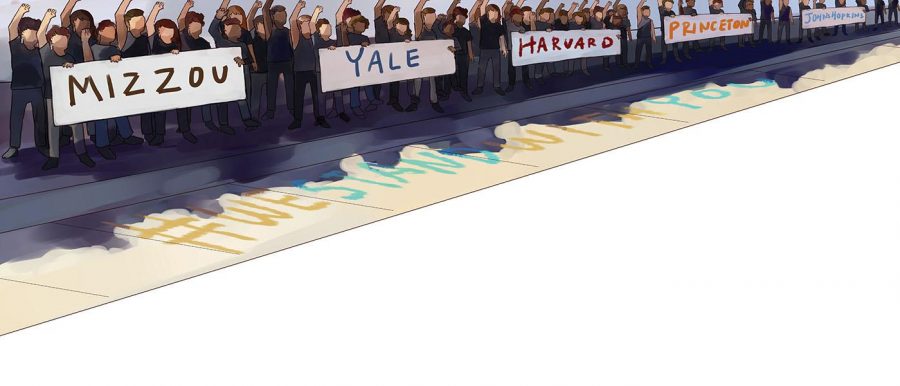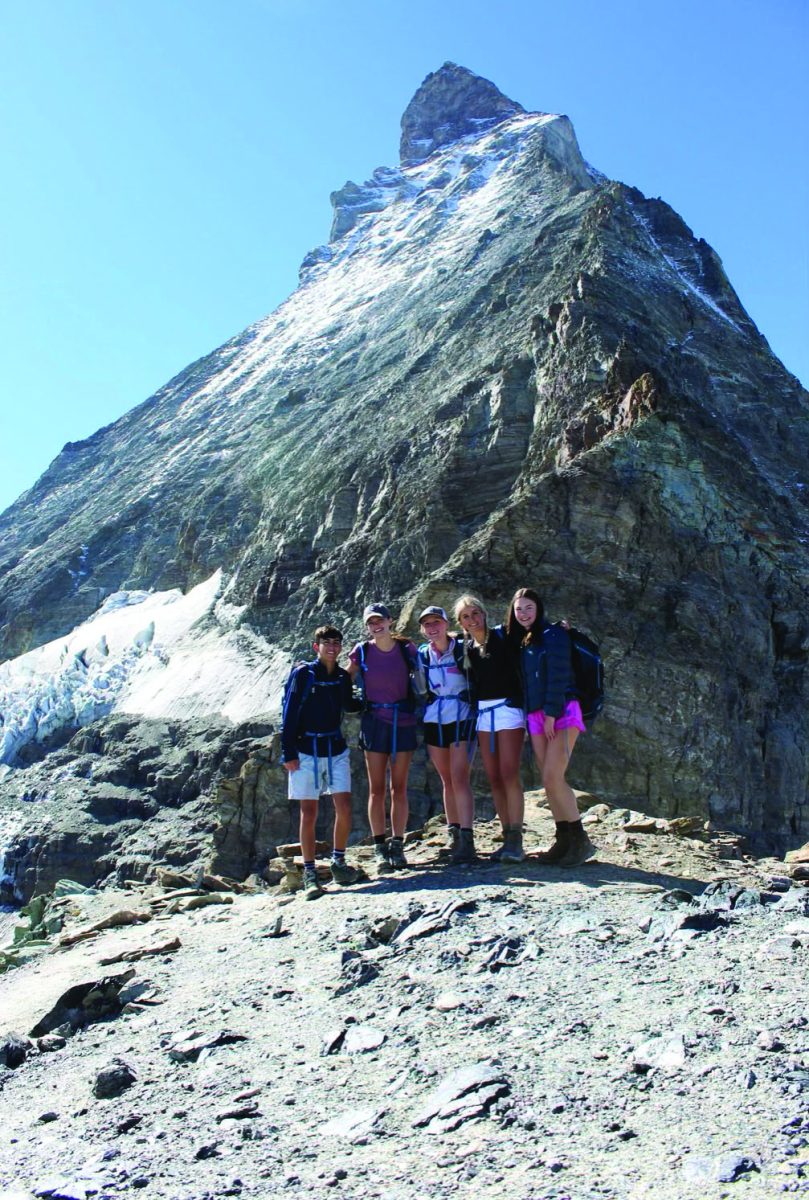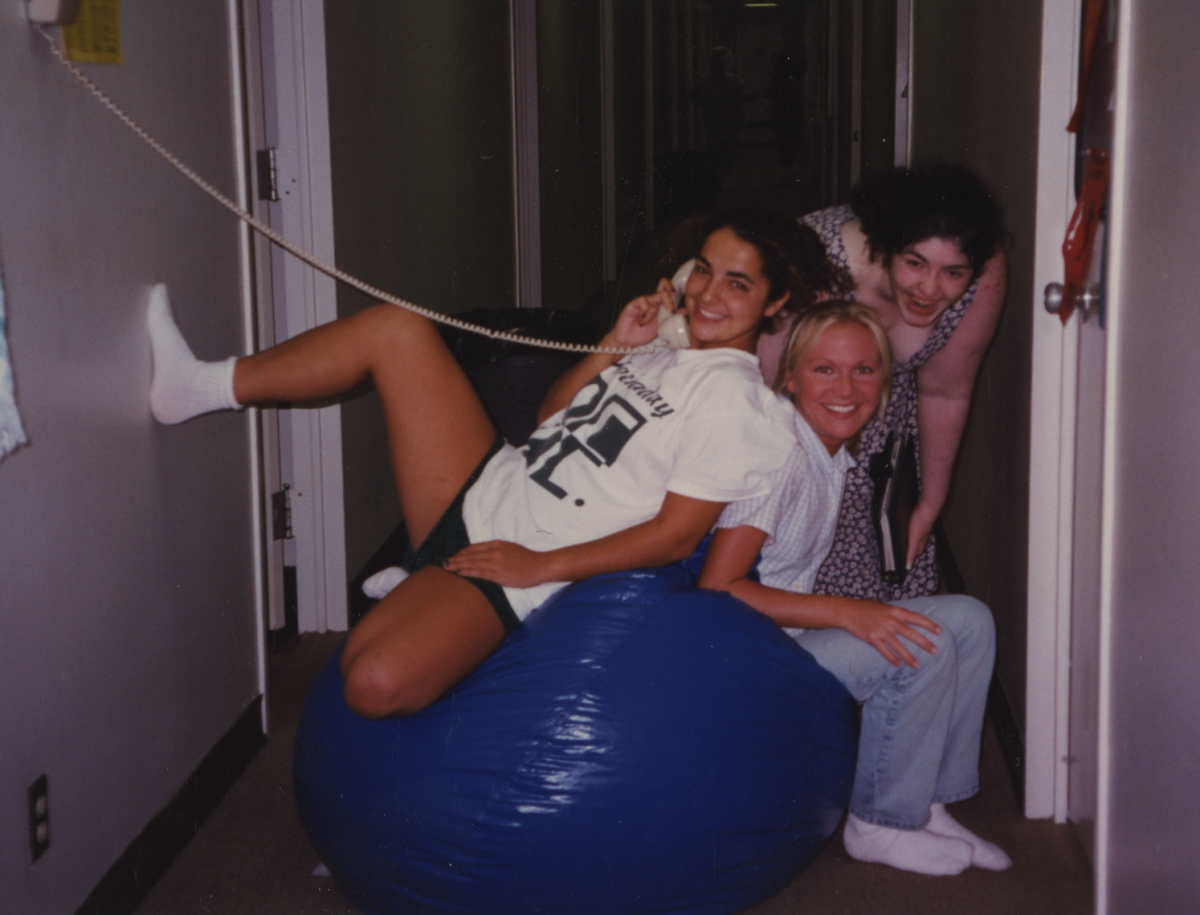For seven days, Mizzou’s grad student Jonathan Butler did not consume a single bite of food. His body began to shut down: he was dying. But none of that mattered. Butler vowed to continue his hunger strike until one of two things occurred: the president of the university was removed from office or his “internal organs failed.”
On Sept. 11, while Payton Head, the head of the Missouri Students Association, was walking through campus, he encountered “some guys riding on the back of a pickup [who] decided that it would be okay [to] continuously scream N– at me.” He posted about this on his Facebook the following day. This was not the first attack Head had endured on campus, and it would not be the last: he decided it was “time to wake up Mizzou.”
As a result of Head’s call for action, five days later Chancellor R. Bowen Loftin posted that “Hate has no place on the Mizzou campus” on Twitter. Although this message was intended to appease the outcries, it did the exact opposite: it fueled them.
The University of Missouri at Columbia’s (Mizzou) Legion of Black Collegians, a black student government union, tweeted on Oct. 5 about an incident where an intoxicated white male interrupted their play rehearsal and called the members the N-word.
“On a daily basis, we face the reality that we are in fact the minority on a predominantly white campus,” the group tweeted.
Although Loftin specified that he would handle the problem, he gave out nothing but empty promises. Despite mandatory online diversity training issued on Oct. 8, no real change was made.
Two days later, a group of students organized under the name “Concerned Student 1950,” named after the year black students were first admitted to the university, protested the school’s homecoming parade and blocked the red convertible that President Tim Wolfe was riding in. They rallied and accused the administration of failing to address racism on campus.
Concerned Student 1950 demanded that Wolfe issue an apology and resign. Although Wolfe attempted to negotiate with the group, he refused to comply with any of their demands.
As a result, graduate student and member of Concerned Student 1950 Butler declared a hunger strike until Wolfe resigned. Because Wolfe first chose to ignore Butler’s strike, student activists camped out on the university’s Traditions Plaza. They refused to leave until Wolfe stepped down from his position.
The resistance continued to grow. On Nov. 7, a group of black football players at Mizzou stated that they would boycott the season until Wolfe either resigned or was removed.
Two days later, Wolfe announced his resignation. Soon after, Loftin publicized that he would also step down from his position as the university’s chancellor at the end of the year.
Although the students were happy to see Wolfe and Loftin resign, they have expressed that there is still a lot of work to do. “There is still an issue at hand that will not be resolved overnight,” a student said in a statement released to USA Today.
Racial Protests Spread to Colleges Around America
Protests on college campuses are not a new occurrence, but they have gathered vast media attention following the events at Mizzou.
Caroline Sydney ‘12 is currently a senior at Yale, one of the universities where there has been widespread racial protests.
To Sydney, it was only a matter of time before protests erupted.
“When the air is filled with gasoline, it doesn’t matter who struck the match,” Sydney said.
Around the same time as the events at Mizzou, Yale was having similar racial tensions. Prior to Halloween, the Intercultural Affairs Committee sent out an email that urged all students to be mindful of their costumes and make sure they were not “culturally unaware and insensitive.” A professor at the university, Erika Christakis, responded to the email saying that it was the costumes were the students’ choice, even if offensive. This, accompanied by a “white-girls only” fraternity party, incited racial protest within the university.
“There was a march of resilience that had over 1,200 students and faculty march around campus and through New Haven just as a show of support,” Sydney said. “Around 1,000 students have gathered around to listen to students of color talk about their experiences and their grievances.”
As a result of the uproar caused by the email controversy, Christakis resigned in early December.
Similar to those at Yale and Mizzou, there have also been a surplus of racial protests at Johns Hopkins University. After noticing that many of the problems at Mizzou were applicable to their own school, the members of the Johns Hopkins Black Student Union organized a protest on campus during which they held up signs with slogans such as “It Happens at Mizzou, It Happens Here Too,” and “Why Don’t My Teachers Look at Me?”
Anisha Anand ‘14, a sophomore at Johns Hopkins, has friends who joined in on the protest. “[The students’] complaints were really just that there is still discrimination on campus and that [students of color] are the target of discrimination by faculty members and other students,” Anand said. “It seems like Hopkins is a little bubble in the city and we don’t reflect the diversity of [it].”
Some, such as Staci Shelby ‘15, a freshman at Louisiana State University and active member of the Black Student Union, believe that these issues have been prevalent on college campuses for quite some time.
“I feel like, at least black communities on college campuses, have had these same complaints [as the students at Mizzou] and no one has listened,” Shelby said. “I don’t know if it’s a new issue, I just think it’s a new issue to the media.”
These universities are just a few of the many where students are rising up and starting discussions regarding racism and discrimination on campus. Other universities across America such as Ithaca College, Smith College, Claremont McKenna University, Vanderbilt University, Occidental College, the University of California–Los Angeles, the University of Southern California and many others have joined this growing national discussion.
In November, Harvard University and Princeton University both announced that they would no longer be using the terms “house master” and “master” because many students connected the terms with slavery. This term was used to describe the university faculty members who overlook academic and social programs and serve as advisers for undergraduate students.
Moving forward, Princeton will refer to these members as “heads of college.” Harvard has yet to assign a new title but plans to do so in the future. As a result of these changes, Yale has also revealed that it will be making a decision regarding the term before the end of the school year.
The universities are hoping that with these changes, minority students will feel more comfortable not only with their advisers but on campus in general.
Hockaday’s Director of Inclusion and Community Tresa Wilson believes that these protests, and subsequently how the school administration’s are handling them, have a critical impact on how current seniors view the colleges they are applying to. “The [seniors] I’ve talked to are really watching those college campuses in which [protests] are happening,” Wilson said. “So, there’s a lot of awareness and concern going on. Especially when [they] start to think, ‘This could affect my experience when I’m on campus.’”
Hockaday Reacts
With the changing climate of racial diversity within these college campuses, Hockaday has instigated a conscious effort to make sure that every student feels comfortable and included on campus.
“This is actually the first time we’ve had a Director of Inclusion and Community,” Wilson said. “This is all I do. And, with that being the case, [I am] trying to do some deliberate programing for each division and see what the students need, how we can be supportive and how we can start having these discussions.”
In order to make sure that students feel supported, Wilson explained that the entire school year is dedicated to a theme: engaging in self-awareness and building courageous conversation skills. With these skills, students can have important conversations in a safe manner that respects all parties.
Part of this process includes bringing in speakers to start conversations about inclusion and diversity. Rosetta Lee, a diversity speaker and a teacher at Seattle Girls’ School, spoke at Hockaday in September. Lee said that it can be easy for people to overlook diversity issues when the problems do not directly affect them.
“When it doesn’t directly impact you and you’re not in the marginalized or invisible bias sedition, it’s a place of privilege because you can go through your day without ever having to think about it,” Lee said. “When reaction and action happens, folks don’t necessarily get involved because they feel like they have no skin in the game.”
Lee believes that there is a way to solve this issue: increase awareness.
“Without preemptive and proactive educational conversations happening, it’s entirely possible to remain ignorant,” Lee said. “Ultimately, it’s not that they are bad people, it’s just that they are not reminded on daily basis what that experience is like.”
Both students and alumnae call for a more direct approach for educating the students on matters of race. “I have preached this since the first [Dallas Area Diversity Youth Organization] meeting I ever went to: I think some sort of mandatory understanding of race and race relations is needed so bad,” Shelby said.
“I think education would cure so many problems even in the Hockaday community.”
Interim Headmistress Liza Lee agrees. At her previous school, the Columbus School for Girls, they allotted an entire day to celebrate Martin Luther King and invited speakers, individual students and faculty to speak about their personal experiences at the school due to their race.
Wilson hopes to have a similar sort of experience by extending the conversation through the International Conversation series. Wilson imagines an environment “where we all learn from each other and talk about the different experiences that we are having, but also hear each other.”
Rosetta Lee hopes that communities will see events like the recent protests at Mizzou as a chance to learn from past mistakes and work towards cultivating a more supportive and inclusive environment.
“I hope that what we do is see these issues of invisible voices speaking up loudly and dramatically and institutions responding and [learning] how to set up positive, inclusive communities that are critically aware of the experiences of all people,” Rosetta Lee said.
Form IV President Brianna Buford also believes that this sort of conversation is necessary.
“Hockaday loves to live under the guise that they are open to discussion with three optional student diversity forums a year, but when this issue and other issues facing people of color on the daily occur, Hockaday stays silent,” she said.
In order to improve upon their conversations with all students, including students of color, Shelby recommends “taking the time to sit down with these groups of students to understand what their specific issues are.”
This is especially important because of the differing experiences students of color have from the rest of the community. “Because society has reminded you through the language they use to refer to you, then also, your family has taught you certain ways to conduct yourself – you put all those layers on top of you and you’re going to walk in, not being completely your whole self all the time,” Wilson said.
Buford shared that her experience as a student of color is different than that of white students.
“I think Hockaday administration should listen before saying and asking anything,” Buford said. “They need to realize that my, and other people of color’s, experience at Hockaday is very different from that of a white student’s and the only way to do that is to listen to their experiences.”
Liza Lee hopes that Hockaday has fostered an inclusive environment where students feel comfortable.
“What I hope is that students don’t feel as helpless here because we are trying to make opportunities for them to talk with trustees, with administrators and with the sponsors of the committees in which they participate,”she said.
Although the recent events on college campuses may suggest that change is starting in a dramatic way, Rosetta Lee thinks that these events will not resonate with the public for long unless proactive conversations ensue.
Quoting from German philosopher Georg Wilhelm Friedrich Hegel, Rosetta Lee said, “The only lesson we learn from history is that we don’t learn from history.”
In a larger sense, Liza Lee believes that racial bias and protests within universities will not end anytime soon. The only thing Hockaday can do is make sure that the students are prepared for future conversations.
“I think we try very hard in our curriculum to make sure that we are sending out students who will be comfortable in being leaders in ensuring that harassment doesn’t occur wherever they are, wherever they can,” she said.
– Heidi Kim and Ashna Kumar













